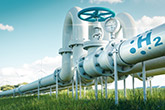Idemitsu launches feasibility study on clean hydrogen production from waste
Published by Bella Weetch,
Editorial Assistant
Global Hydrogen Review,
Idemitsu Kosan Co., Ltd., one of Japan’s leading producers and suppliers of energy, launched a feasibility study of clean hydrogen production in Japan generated from waste, including municipal waste, in April. The goal is to launch a hydrogen production facility in around 2030 that is capable of processing 200 – 300 tpd of waste.
The study is conducted in collaboration with California-based H-Cycle, LLC, which has developed a thermal conversion process using heat and electricity to transform waste into hydrogen with minimal emissions. HC is an investee of the Azimuth V Energy Evolution Fund, an investment fund launched by Azimuth Capital Management specialising in technology-enabled energy transition opportunities. Idemitsu has committed to invest in the fund in November 2021.
Hydrogen, which does not emit carbon dioxide (CO2) when burned, is widely expected to be deployed at large-scale as a next-generation energy source to realise a carbon-neutral society. In the future, Japan is expected to rely on imports for most of the hydrogen procurement, and to be used mostly by industrial facilities in coastal areas. Widespread use of hydrogen will require securing inexpensive raw materials and reducing supply costs by building a supply chain enabling mass manufacturing and mass transportation.
The hydrogen production now being considered by Idemitsu and HC will use waste discharged in Japan, including municipal waste, as raw material. The system converts these waste products into high-value-added clean hydrogen using an integrated gasification and plasma polishing process for which HC holds exclusive rights to deploy in Japan.
Features of the project
- By utilising resources such as waste as a raw material, clean hydrogen can be produced and supplied domestically. In conventional hydrogen production, fossil fuels such as natural gas are used as raw materials. In production with waste, there is no need to use fossil fuels as raw materials. The hydrogen production now being considered can process a wide variety of wastes as raw materials, not limited to household waste. Biomass feedstock such as food waste offsets CO2 emissions during hydrogen production, making this a production method with lower CO2 emissions than conventional hydrogen production. Furthermore, by sequestrating and utilising the highly-concentrated CO2 emitted during the production process, even cleaner hydrogen production becomes possible, and this also contributes to reducing CO2 emissions associated with waste disposal.
- Hydrogen production from waste in various regions of Japan will be possible through collaboration with local governments. By installing this integrated gasification and plasma polishing process as a waste treatment facility in each region to produce hydrogen, it is possible to reduce transportation costs and develop supply bases for hydrogen that is locally produced and consumed. Idemitsu aims to spread efficient waste treatment technology and realise local production for local consumption of energy.
The clean hydrogen produced is expected to be used not only for industrial and mobility applications, such as fuel cell vehicles, but also as raw material for synthetic fuels.
Aiming to construct an initial hydrogen production facility around 2030 that will process 200 – 300 tpd of waste, Idemitsu will going forward seek the cooperation of local governments and determine partner companies for equipment operation and maintenance.
Read the article online at: https://www.globalhydrogenreview.com/hydrogen/18042023/idemitsu-launches-feasibility-study-on-clean-hydrogen-production-from-waste/
You might also like
Plug Power supplies hydrogen to pipeline
Plug Power has completed the first green hydrogen fill of Hynetwork’s 32 km hydrogen pipeline in Rotterdam, the Netherlands.

